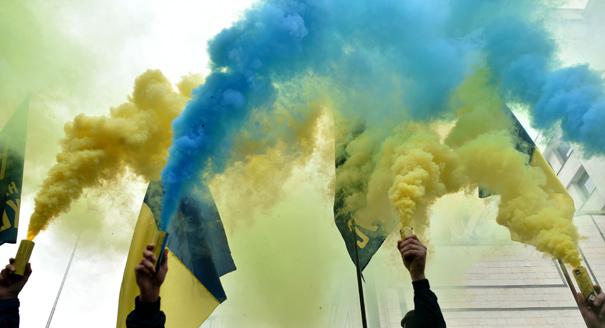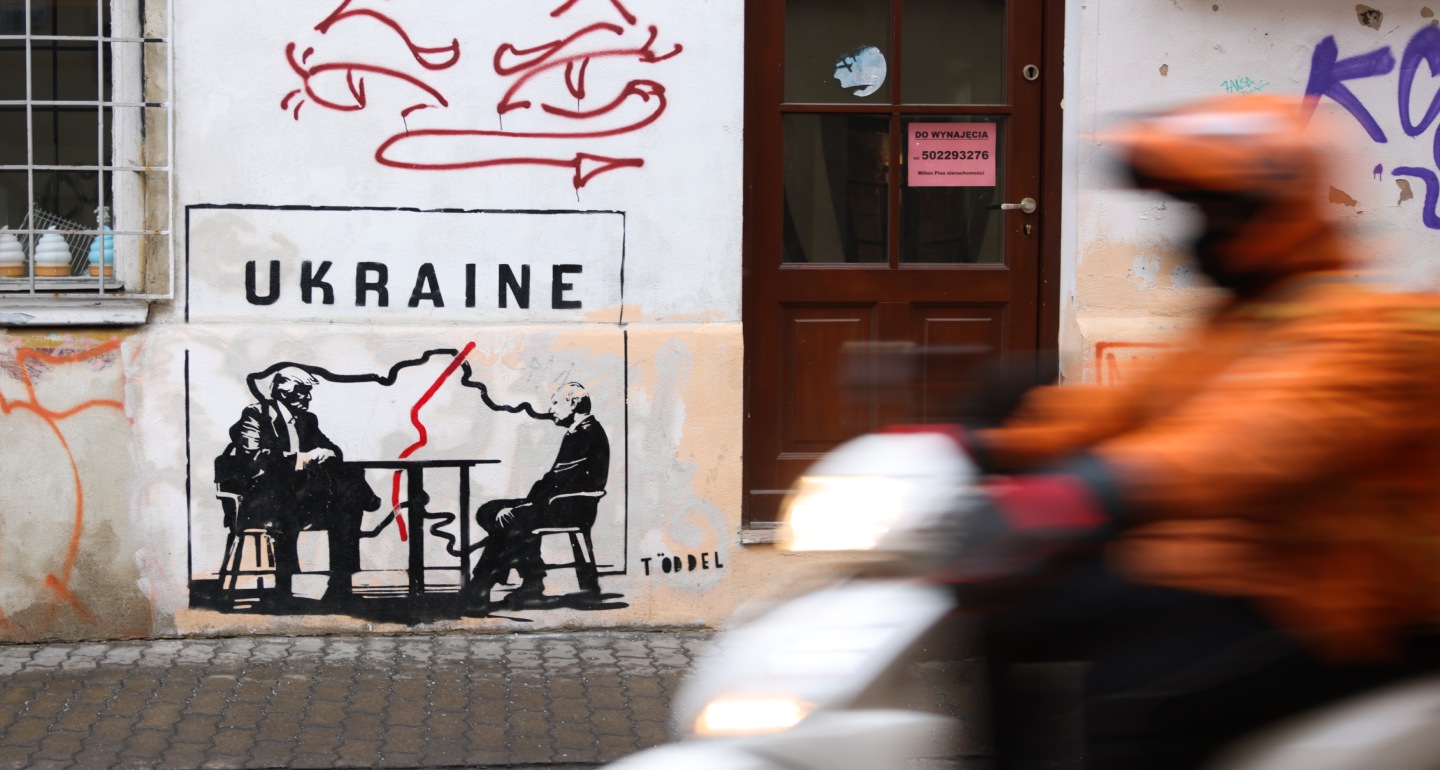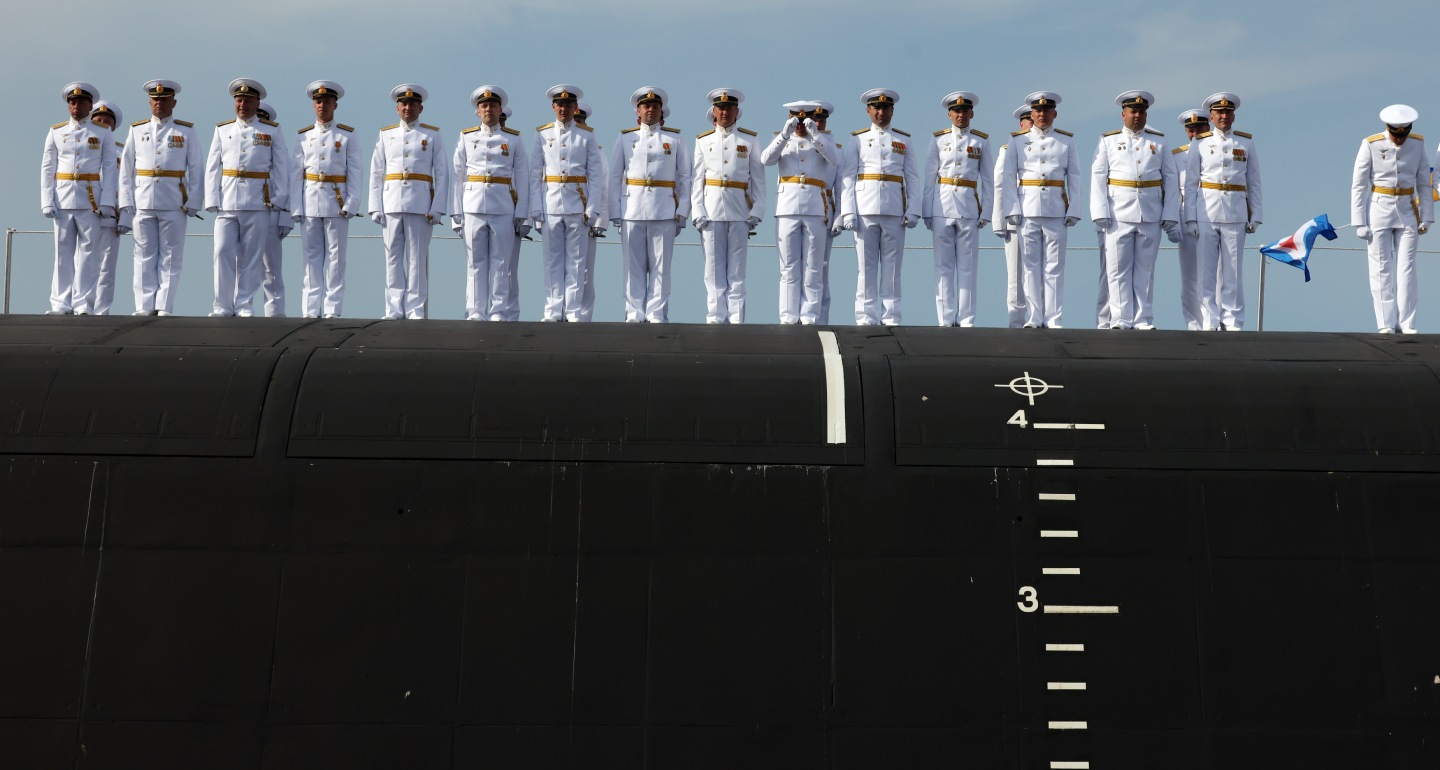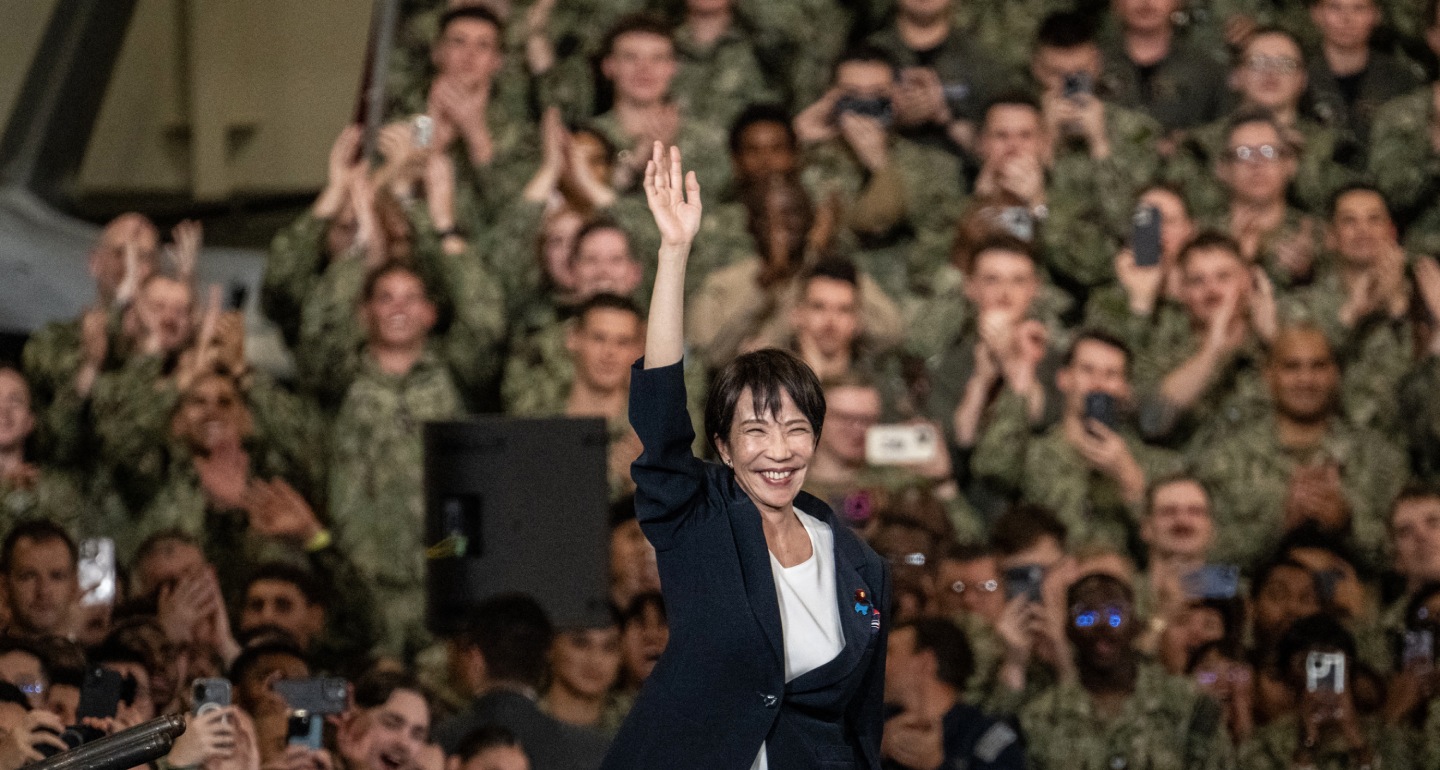The chaotic U.S. withdrawal from Afghanistan has prompted some in Russia to claim that the United States is no longer a superpower, and that with time, it will also abandon Ukraine to its fate. This would suggest that all is not lost for Moscow in Ukraine, and that the time may be approaching when the Americans will give up on Ukraine, and it will return to Russia’s geopolitical pull.
The role of the United States is beyond the scope of this article, but claims that Ukraine inevitably faces an “Afghan” future deserve a response, not least because they are based on incorrect, preconceived ideas.
Russia’s approach to relations with Ukraine traditionally stems from the view of the neighboring country as a highly attractive asset. First, it is pointed out that Ukraine is part of the historical heart of the Russian state, and its capital Kiev “the mother of Russian cities,” hence the period of Russian history known as Kievan Rus. Second, proponents of this approach insist, Russians and Ukrainians are one people who have been arbitrarily separated by the anti-Russian policies of the Kyiv authorities.
Third, it is noted that Ukraine occupies a crucial strategic position between Russia and the NATO member countries. Finally, it is mentioned that Ukraine has great demographic, economic, scientific, and cultural potential which, when combined with Russia’s, could help the latter to become a global power center.
Consequently, Ukraine’s alienation from Russia is seen as the disintegration of Russia’s historical heartland, leaving it incomplete. It also shatters the unity of the Russian people and Russian Orthodox civilization, and turns a solid buffer zone on Russia’s southwestern flank into a convenient staging area from which a foreign enemy could strike right at the heart of Russia, depriving Russia of any chance of becoming a global economic heavyweight.
Variations on these arguments have been a constant staple of Russian political rhetoric ever since Ukraine’s 2014 Maidan revolution, or even the earlier Orange Revolution of 2004–2005. What’s more, they are apparently at the heart of many recent decisions. It seems they are taken at face value by both supporters and some opponents of Russia’s current behavior toward Ukraine, yet all of those arguments are invalid.
An Empire of Myths
First and foremost, the Russian Federation is a full-fledged Russia and standalone state that does not need to expand its territory, least of all toward Ukraine. Russia became a unified power long before Tsar Alexei Mikhailovich conquered the Cossacks of modern-day Ukraine in 1654. Despite the U.S. political scientist Zbigniew Brzezinski’s oft-cited purported axiom that without Ukraine, Russia ceases to be an empire, Russia did not become an empire as a result of incorporating Kyiv and other land on both sides of the River Dnieper, and it remained a global player even after Ukraine declared independence in 1991.
On the contrary, the heart of modern Russia lies within the current borders of the Russian Federation. This heartland has remained unified throughout all the cataclysms Russia has undergone, including the revolution and ensuing civil war at the start of the twentieth century, and the collapse of the Soviet Union.
The thousand years of Russian statehood do, of course, include the period of Kievan Rus, but the cradle of that statehood—and the place from where the first ruling dynasty issued—is rightly considered to be Novgorod.
As for the people, Russians make up the backbone of the Russian political nation, whose consolidation is a key condition for the stability of society and the state. There are many people living in Ukraine who are both ethnically and psychologically close to both ethnic Russians and Russian nationals in general. But we should not forget that Ukraine is diverse, both culturally and in terms of religion. People in Galicia and Volhynia in western Ukraine hold very different—sometimes even opposing—values to those living in Donbas and the area referred to by some in Russia as Novorossiya. The process of forming the Ukrainian political nation is a highly complex one, and for now, there is no such thing as a unified Ukrainian people.
Accordingly, the idea of reuniting the Russian people supposedly divided by the Russia-Ukraine border is in fact a trap. If, purely hypothetically, the Russian nation was expanded to include most of Ukraine’s population—as it is today, thirty years after the collapse of the Soviet Union and seven years after Maidan, and not as it exists in our memories and imagination—then that expansion would be more likely to shatter the unity of Russians than to strengthen it. Integration is possible and even desirable, but on an individual basis, not by expanding territory.
New Realities
The significance of Ukraine’s strategic position for Russia’s security interests has also clearly been exaggerated. The current situation is very different from that in the twentieth century. Mutual nuclear deterrence, high-precision weapons with global reach, and changes to the balance of geopolitical forces and layout of the main antagonists in the world make a large-scale armed conflict in Europe unlikely. War is, unfortunately, still possible, but is more likely as the result of the unforeseen escalation of a conflict, or a series of incidents between armed forces not being stopped in time.
Recently, Russia has relied less on its mantra of the dangers of Ukraine joining NATO, and replaced it with the specter of Kyiv becoming a U.S. ally outside of NATO. Still, the stability of nuclear deterrence and the further development of Russian strategic arms exclude any possibility of Washington being able to gain any significant strategic advantages over Russia as a result of a possible (though unlikely) establishment of U.S. bases on Ukrainian soil. Washington continues to supply Kyiv with arms, but the prospect of a military engagement with Russia over Ukraine, where U.S. interests are limited, forces American politicians to proceed with caution.
At the start of the 2010s, Ukraine’s economic and demographic potential was a key argument in favor of getting Kyiv to join what became the Eurasian Economic Union project. Back then, Moscow planned to create an economic bloc of about 200 million people. Another important aim of Russian policy was to preserve the military technology and economic ties left over from Soviet times. Those ties were considered unbreakable.
Since then, the Russian defense industry has managed to replace military imports from Ukraine. And as for those 200 million people, the population of modern Ukraine has decreased significantly, from nearly 50 million at the collapse of the Soviet Union to an estimated 35 million: about the same as the population of Uzbekistan. Today, it would make more sense for Russia to develop its economic ties to the southeast, rather than to the southwest.
The End of Dreams
Once these arguments are taken into account, Russia’s approach to relations with Ukraine could be adjusted to look as follows.
Ukraine is a neighboring country that will never again become a brotherly nation. Any ambition of integration should be filed away once and for all in the historical archives, and replaced with that of good neighborly relations.
Even this prospect is admittedly a remote one. For it to become reality, there would have to be a leadership in place in Kyiv that is capable of establishing pragmatic relations with Moscow. Such a change of mood in Ukraine is unlikely to come any time soon, if at all. At the same time, the geographical, economic, and political circumstances mean that anything is possible.
Russia, accordingly, must not indulge any fantasies that it will one day grow again to encompass Ukraine—or even its southeastern regions. This would not even be advantageous to Russia: the hypothetical rebuilding of the “Russian” parts of Ukraine would require vast sums of money. Nor should it be forgotten that back in their time, none of the Soviet ideologists were able to change the minds of Ukrainian nationalists. The experience of the last three decades leaves no doubt that vast Russian aid through a hypothetical joining of the two countries would not be sufficient to do so either.
Instead of acquiring land, Moscow should focus on acquiring people. Not by automatically handing out Russian passports to anyone who would like to be able to nip over the border and draw a pension: that project is already being implemented in the parts of the Donbas no longer under Kyiv’s control. Instead, Moscow should act strategically, by making moving to Russia to live and work an attractive prospect for Russian speakers from Ukraine and other former Soviet countries, above all for highly skilled specialists.
That is the real way to establish a united people, and on the territory of Russia, too. Instead of forming a group of people with Russian citizenship on the edge of its former empire who will become the support base for local pro-Russian political forces, Moscow should be shoring up the demographic and professional potential of Russia itself. Then it might find that its relations with its neighbors would develop in a way that more closely meets its own interests.
Transitioning to Neighbors
Lately, Russia has correctly sensed that issues related to Ukraine have become less of a priority for Western governments. In the United States and Europe, post-Soviet Ukraine has never been seen as a particularly valuable political, military, or economic asset.
The main reason Barack Obama’s administration acted as it did by supporting the Maidan uprising in 2014 was apparently its desire to discourage Ukraine from joining the Moscow-led Eurasian Economic Union. The European Union, for its part, sought to use its Eastern Partnership program to create a comfortable buffer zone separating it from Russia. It was as simple as that.
Seven and a half years later, Western countries have shown no desire either to integrate Ukraine into European and Atlantic institutions or to seriously invest in the Ukrainian economy. Politicians in Europe and the United States may still voice their support for Ukraine’s position on the Donbas or Crimea, but make no bones of the fact that they are tired of Ukraine and its problems. Against this backdrop, some in Moscow believe that this decreased Western interest in Ukraine opens up opportunities for Russia. That is a serious delusion.
The whole point of the concept of Ukraine as an independent political entity lies in its distancing and dissociation from Russia. The most concise formulation of this idea was expressed by former Ukrainian president Leonid Kuchma in the title of his book: Ukraine Is Not Russia. This distancing can take various forms—overt and ruthless, like right now, or covert, hypocritical and parasitical, like under Kuchma and president Viktor Yanukovych—but the overall concept remains the same.
The Ukrainian political elite and its leadership will not abandon this concept, regardless of what rotations in that leadership might occur. They will remain the spiritual heirs of Ivan Mazepa, the eighteenth-century Cossack leader who betrayed Peter the Great to go over to the enemy side in Russia’s war with Sweden. In their eyes, Ukrainian independence equals independence from Russia.
There is also an even less palatable truth for Russia. The Ukrainian ruling elite relies on an active minority who are guided by Western values, and a passive majority who simply don’t want to get involved, and whose values are both specific and largely material. The “Russian Spring” of 2014 had no real chance of success (beyond Crimea and certain parts of Donbas), and nor, in the years that followed, did the “Russian World” invoked by President Vladimir Putin upon the annexation of Crimea.
The lack of any widespread public reaction in Ukraine to laws passed there banning Russian-language teaching in schools and severely limiting access to Russian culture are testament to the futility of hopes for a pro-Russian revolution. But that’s not the main issue.
What matters most for Russia is that to enact its top national interests in areas such as state identity, national solidarity, security, and economic development, Russia simply does not need Ukraine. In fact, the U-turn in Ukrainian politics brought about by the Maidan revolution resulted in significant financial savings for Russia. Had Yanukovych clung on for another six months, $3 billion in nonreturnable Russian loans would have become $15 billion, as promised by Putin.
According to Putin, Russia spent $82 billion on supporting Ukraine in the first two decades following the collapse of the Soviet Union: a vivid illustration of then president Boris Yeltsin’s appeal to officials to ask themselves daily what each of them had done that day for Ukraine. Ultimately, it’s now clear that those deeds amounted to dead losses on an enormous scale.
Despite all of this, the importance of Ukraine for Russia is still greatly overstated, not so much in the public consciousness as in the minds of the elite. It’s time to acknowledge that disparity and, having accepted it, to carry out a long overdue reevaluation of that importance.
This is not to say that Ukraine can be ignored—quite the contrary.
— Right now, Ukraine is more hostile to Russia than any other country in the world. The degree to which Kyiv is willing—and able—to take combative action against Moscow should not under any circumstances be understated. The contemptuous, sneering attitude to the modern Ukrainian state that has formed under the influence of Russian state propaganda can only result in unpleasant surprises.
— In reining in Kyiv’s impulses to use force to resolve the problem of the Donbas, Russia must avoid a large-scale war with Ukraine: that would be a catastrophe and a tragedy for millions of people that nothing could possibly justify.
— While continuing to abide by the Minsk peace agreements and maintain a dialogue, above all with Germany and France (as parties to the agreements) within the Normandy format, Russia must acknowledge that for Kyiv, the agreements are a symbol of defeat in war and diplomatic capitulation, and that Ukraine cannot and will not implement the terms of the agreements. The most that can be hoped for is the observance of a stable ceasefire in the Donbas, with no new victims along the line of contact.
— Amid a lack of official dialogue, it would make sense to keep in contact and communicate with the few moderate groups and figures in Ukraine, since in the long term, there might be an opportunity to start the process of normalizing Russia-Ukraine relations.
— The concept of the Russian World (the Russian Orthodox civilization, according to the British historian Arnold Toynbee) needs to be reevaluated and applied in Ukraine with a focus on culture and language, removing or at the very least minimizing the concept’s geopolitical component. There is still an audience for the cultural Russian World in Ukraine, and there will be for the foreseeable future. It’s essential to overcome the barriers that have been put up in recent years to interact with that audience.
— While modern-day Ukraine must be accepted as a sovereign foreign state, the history of Ukraine prior to 1991 should not be erased.
The “Little Russians,” as those living in modern-day Ukraine were then known, made an invaluable contribution to state-building, economics, science, and culture in pre-revolutionary Russia, as did Ukrainians to the country’s twentieth-century development.
— Finally, modern Ukraine must be given close and serious study in Russia, to replace mythologized impressions of the former Soviet republic with real knowledge and proper understanding of how this large neighboring country is structured and operates. Russia and Ukraine will never be one country again, and that’s no cause for regret. They do, however, have to learn to live alongside each other.
This publication is part of a project carried out with the support of the Royal Danish Embassy in Moscow.










